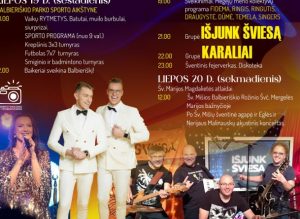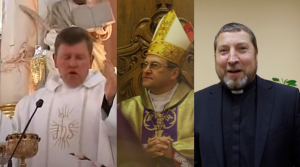Apie lietuvių kalbą

Lietuvių kalba, kokia sena ji bebūtų, pasižymi nuostabia struktūra, tobulesne už sanskritą ir graikų kalbą, žodingesnė negu lotynų kalba ir nepalyginamai įmantresnė, negu bet kuri iš paminėtų trijų. Ir vis dėlto lietuvių kalba turi su visomis trimis kalbomis didesnį giminingumą, negu kad gamta būtų būtų galėjusi sukurti, ne tik veiksmažodžių šaknyse, bet ir taip pat ir gramatinės struktūrosformose bei žodžių morfologinėj konstrukcijoj. Toks aiškus giminingumas, kad bet koks filologas gali matyti labai aiškiai, kad sanskritas, graikų ir lotyno kalbos turėjo išssivystyti iš bendro šaltinio – lietuvių kalbos. Dėl panašios priežasties galima daryti prielaidą, kad heruliai, rugiai, gotai, senprūsiai, latviai ir jų kalbos buvo tos pačios kilmės, nes jie buvo senovės lietuviai. Mokslininkai yra pripažinę lietuvius primityvios arijų kultūros ir civilizacijos atstovais. Įžymūs filologai sutinka, kad lietuvių kalbayra ne tik seniausia kalba pasaulyje šiandien, bet ir arijų pripažinta kaip jų kalbų šaltinis prieš pastebint sanskrito evoliuciją. Lietuvių kalbos senumas ir jos gramatinė struktūra priskiria ją tam pačiam laikotarpiui kaip ir seniausias sanskritas – 2000m. pr.m.e. arba dar anksčiau. Lietuvių kalba yra arijų prokalbė ir žymiems kalbininkams buvo žinoma, kad ji buvo šnekamoji – nerašytinė kalba, vartojama Europoje daugelį šimtmečių. Tačiau naujausi lingvistiniai tyrinėjimai aiškiai įrodo, kad lietuvių kalba buvo rašoma netgi prieš krikščionybės erą, nors kaip seniai prieš krikščionybės erą yra sunku nustatyti. Bet remiantis ligvistiniais įrodymais ir senoviniais raštais Indijoj ir Persijoj, galima manyti, kad lietuvių kalba buvo rašoma net 1000 metų prieš Kristaus gimimą. Turtingiausias lietuvių kultūros paveldas yra jų kalba, kuri yra vienas iš didžiausių žmonijos pasiekimų. Ji pralenkia visas kitas Europos kalbas savo antikiškumu, garsų grynumu ir savo nuostabia gramatine struktūra. Galima aiškiai matyti aukščiausiai išvystytos gramatikos ir iš natūralių ir gražių jų kalbos garsų, kad lietuviai iš tiesų turėjo kūrybingumo genijų labai ankstyvoje mūsų civilizacijos eroje. Lietuvių kalbos balsių sistema yra labiausiai antikinė savo stiliumi. Ji yra senesnė, negu sanskritas, latvių, graikų ir lotynų kalbos čia išdėstyta tvarka. Lingvistinės paleontologijos duomenimis yra tiesa, kad iš visų kalbų tik lietuvių kalba išlaikė primityviosios arijų šnekamosios kalbos grynumą nuo to tolimo antikinio laikotarpio iki šių dienų.Daugelis antikinių kalbų seniai išnyko iš žmonijos istorijos, tačiau lietuvių kalba yra kaip antikinis balto marmuro paminklas, kuris tebestovi neapneštas laiko dulkėmis po daugelio šimtmečių ilgaamžės žmonijos istorijos. Lietuvių kalbos morfologija aiškiai mums atskleidžia daug neišaiškintų senovės civilizacijos istorinių paslapčių, žymiai išplečia lingvistikos mokslo horizontus ir praplečia žmonijos žinias apie jos dar neatskleistą praeitį. Atradimas lietuvių kalbos stebėtino panašumo su avesta (senąja persų kalba) ir su sanskritu akivaizdžiai atvėrė naujus horizontus lingvistikos mokslo srityje, remiantis lyginamosios morfologijos išvadomis. Dar daugiau, lietuvių kalbos morfologija įtikinamai įrodo, kad valdančioji klasė arva senovės hititų ( Hittite-Gititis) valdovai turėjo pavardes, panašias į lietuvių. Žymus anglų mokslininkas Robert G. Latham buvo absoliučiai teisus, kai jis pareiškė: “Pačioje kalboje glūdi daugiau, negu bet kuriuose jos kūriniuose…” Šiandien pasaulis būtų daug turtingesnis kultūros atžvilgiu, jei Lietuva būtų nepriklausoma, kadangi lietuvių tauta atstovauja ne tik arijų prokalbės civilizacijai ir kultūrai, bet taip pat turi didžiausią brangenybę pasaulyje – savo senovinę gražią kalbą. Lietuvių kalba išaukštinta dėl jos antikiškumo bei grožio ir dėl jos didelės reikšmės lyginamosios filologijos mokslui ne tik žinomų kalbininkų, bet ir didžiausio iš visų filosofų – Imanuelio Kanto. Sekančios fragmentinės citatos iš garsių kalbotyros mokslininkų darbų parodys lietuvių kalbos vertingumą ir svarbą pasaulio kultūrai. Benjamin W. Dwight savo knygoje Modernioji filologija (Modern Philology) labai stipriai pabrėžia didžiulę lietuvių kalbos reikšmę kalbotyros mokslui. Jis taip sako apie lietuvių kalbą: “Iš visų Europos kalbų lietuvių kalba turi didžiausią skaičių maloninių ir mažybinių žodžių, daugiau, negu ispanų ar italų kalbos, netgi rusų, ir jie gali būti dauginami be galo, pridedant juos prie veiksmažodžių ir prieveiksmių, lygiai kaip prie būdvardžių ir daiktavardžių. Jeigu tautos vertė, imant visą žmoniją, būtų matuojama kalbos grožiu, tai lietuvių tauta turėtų užimti pirmą vietą Europos tautų tarpe”. Įžymus anglų lingvistas Isaac Taylor savo knygoje Arijų kilmė (The Origins of the Aryans) pareiškia labai įdomų ir svarbų komentarą apie lietuvių kalbą. Jis teigia, kad arijų civilizacija turėjo būti lietuvių gyvenamose vietose. Jis komentuoja taip: “Galima spėlioti, kad, jeigu turėtume lietuvių literatūros iš to laikotarpio, kaip seniausia indų literatūra, galėtume su didesniu tikrumu teigti, kad arijų kalbos lopšys turėjo būti lietuvių apgyventoje teritorijoje”. Anot žinomo anglų mokslininko Robert G. Latham, lietuvių kalba turi daugiau giminingumo su sanskrito kalba, negu bet kokia kita, gyva ar mirusia, kalba pasaulyje. Savo knygoje Aprašomi etnoligija (Descriptive Ethology) jis taip išsireiškia apie lietuvių kalbą: “Be abejonės sanskrito giminingumas su lietuvių kalba yra didesnis, negu bet kokia kita kalba šioje Žemėje”. Lietuvių kalbos svarbumą taip pat pripažino naujųjų laikų didžiausias filosofas Immanuel Kant (1724-1804), kuris buvo gimęs Rytprūsiuose (Prussian Lithuania) ir gerai mokėjo lietuvių kalbą. Savo Lietuvių-vokiečių kalbų žodyno (Lithuanian and German Dictionary) pratarmėje jis rašė, kad lietuvių kalba nusipelno būti valstybės apsaugoma. Jo komentaras apie lietuvių kalbą turi didelę istorinę reikšmę, nes jis yra autoritetingas ir patikimas. Jis buvo ne tik filosofas, bet ir kalbininkas. Jis taip komentuoja apie lietuvių kalbą: “Iš tikrųjų, jokia kita pasaulio kalba nėra gavusi tiek aukštų pagyrimų kaip lietuvių kalba. Lietuvių tautai buvo priskirta didelė garbė už sukūrimą, detalių išdailinimą ir vartojimą aukščiausiai išvystos žmogiškos kalbos su savita gražia ir aiškia fonologija. Be to, pagal lyginamąją kalbotyrą, lietuvių kalba yra labiausiai kvalifikuota atstovauti pirmykštei arijų civilizacijai ir kultūrai”.
The New York Times LITHUANIAN LANGUAGE
By Theodore S. Thurston
The Lithuanian language, whatever its antiquity, is of a wonderful structure, more perfect than either Sanskrit or Greek, more copious than Latin, and exquisitely refined than any of these three. Yet, Lithuanian bears to all of them a stronger affinity than could have been produced by nature, not only in the roots of verbs, but also in forms of grammatical structure and the morphological construction of words. So strong is this affinity that any philologist can see very clearly that Sanskrit, Greek and Latin must have sprung from a common source, Lithuanian. There is a similar reason for supposing that the Heruli, Rugians, Goths, Old Prussians, and Latvians, and their language, had the same origin, for they were ancient Lithuanian people. Scholars have recognized the Lithuanians as exponents of the primitive Aryan culture and civilization. Renowned philologists have agreed that the Lithuanian is not only the oldest language in the world today, but the language used by Aryans before the invention of evolution of Sanskrit. The antiquity of Lithuanian language and its grammatical structure place it in the same period with the oldest Sanskrit – 2000 B.C. or earlier. Lithuanian is a Proto-Aryan, and to the renowned linguists, it was known to be unwritten language in Europe for many centuries. However, recent linguistic investigations have definitely proven that the Lithuanian language was written even before the Christian era, though how far before it is difficult to determine with any degree of accuracy. But from the linguistic evidence and ancient writings in India and Persia, it is possible to assume that Lithuanian language must have been written as far back as one thousand years ago before the birth of Christ. The richest cultural heritage of the Lithuanian people is their language, which represents one of highest achievements of all mankind. It surpasses all other European languages in its antiquity, the purity of its sounds, and its wonderful grammatical structure. It can be clearly seen, by a study of the highest developed grammar and the natural and beautiful sounds of their language, that the Lithuanians indeed possessed a creative genius in a very early era of our civilization. The vowel system of the Lithuanian language is the most ancient in its style. It antedates Sanskrit, Latvian, Greek and Latin in that order. According to linguistic palaeontology, it is true that of all languages, only Lithuanian has preserved the purity of the primitive Aryan speech from that remote period of antiquity to the modern age. Many ancient languages have vanished long ago from the knowledge of mankind; however, the Lithuanian language is like an ancient monument of white marble – it still stands untarnished after many centuries of man’s long history. The morphology of the Lithuanian language clearly reveals to us many unsolved historical mysteries of ancient civilization, significantly expands the horizon of linguistic science and broadens mankind’s knowledge of his dark past. The discovery of the remarkable similarity of the Lithuanian language to Avesta (Old Persian) and Sanskrit has clearly opened new frontiers in the field of linguistic science according to the conclusions of comparative morphology. Moreover, the morphology of the Lithuanian language definitely proves that the ruling class, or the kings of the ancient Hittite (Gittitis) nation, had surnames similar to Lithuanian surnames. The renowned English scholar, Robert G. Latham, was absolutely correct when he said “…There is more in language than in any of its productions…” Today the world would be far richer in its culture if Lithuania were independent, because the Lithuanian nation represents not only the Proto-Aryan civilization and culture, but also has the richest treasure in the world – its ancient beautiful language. The Lithuanian language has extolled for its antiquity and beauty, and for its great importance in the field of comparative philology not only by the renowned linguistic scholars, but also by the greatest philosopher of all, Immanuel Kant. The following fragmentary quotations from eminent linguistic scholars will show the value and importance of the Lithuanian language to the culture of the world. Benjamin W. Dwight, in the book Modern Philology, very strongly emphasizes the great value of the Lithuanian language in the field of linguistic science. He comments on the Lithuanian language as follows: “Of all European languages, the Lithuanian has the greatest number of affectionate and diminutive terms, more than the Spanish or Italian, even more than Russian, and they can be multiplied almost indefinitely by adding them to verbs and adverbs as well as adjectives and nouns. If the value of a nation in the total sum humanity were to be measured by the beauty of its language, the Lithuanian ought to have the first place among the nations of Europe” The eminent English linguistic scholar Isaac Taylor, in his book The Origin of the Aryans, make a very interesting and important comment on the Lithuanian language. He states that the Aryan civilization must have been in the Lithuanian region. He comments as follows: “It may be surmised that if we possessed a Lithuanian literature of a date contemporary with the oldest literature in India, it might be contended with the greater reason that the cradle of the Aryan language must have been in the Lithuanian region” According to the renowned English scholar, Robert G. Latham, the Lithuanian language has a stronger affinity to the Sanskrit language than all other languages in the world, living or dead. In his book Descriptive Ethnology, he comments on the Lithuanian language as follows: “Now, without doubt, the affinities of the Sanskrit are closer with the Lithuanian than with any other language on the face of the earth.” The importance of the Lithuanian language was recognized also by greatest philosopher of modern times, Immanuel Kant (1724-1804), who was born in Prussian Lithuania and had a thorough knowledge of the Lithuanian language. In his preface to a Lithuanian and German Dictionary, he wrote that the Lithuanian language deserved the protection of the state. His comment on the Lithuanian language has a great historical significance, because his comment is authoritative and reliable. He was not only a philosopher, but also linguist. He comments on the Lithuanian language as follows: “As a matter of fact, no other language in the world has received such praise as the Lithuanian language. The garlands of high honour have been taken to Lithuanian people for inventing, elaborating, and introducing the most highly developed human speech with its beautiful and clear phonology. Moreover, according to comparative philology, the Lithuanian language is best qualified to represent the primitive Aryan civilization and culture”.







